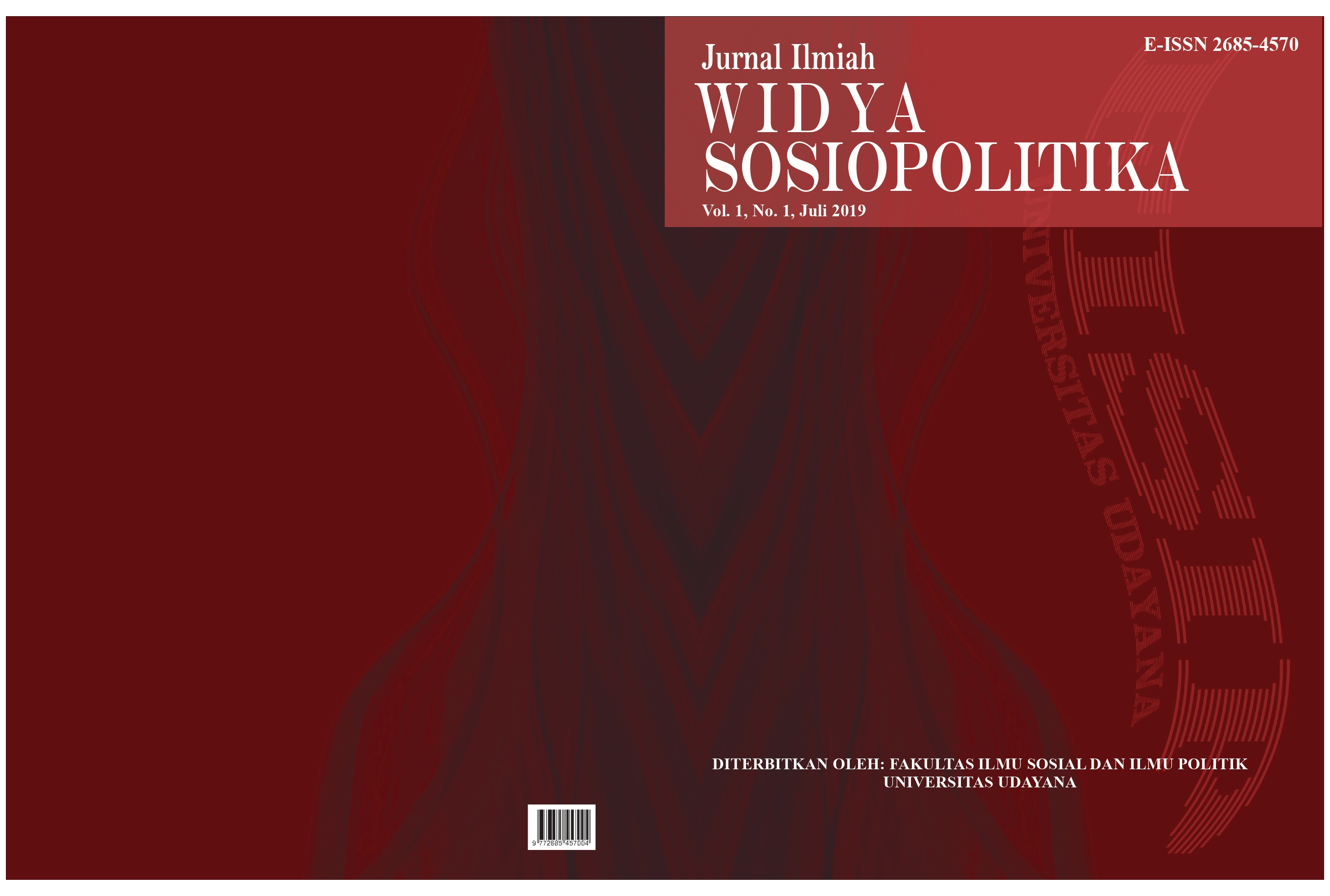AKTUALISASI INDONESIA DALAM G20: PELUANG ATAU TREN?
Abstract
ABSTRAK
Bermula dari sebuah pemikiran untuk menyelesaikan krisis keuangan global, dan diperlukannya sebuah penguatan internasional yang berasal dari komitmen negara-negara yang mempunyai skala ekonomi terbesar, eksistensi G20 menjadi sebuah harapan baru bagi pertumbuhan ekonomi dunia. Klub ekonomi eksklusif ini hadir untuk memberikan sebuah kerangka global, yang kemudian diinfiltrasikan ke berbagai institusi internasional ataupun mekanisme kerjasama ekonomi. Banyak negara yang memberikan pengharapan pada komunitas ekonomi eksklusif ini melalui keterwakilan anggota aktif dalam kelompok ini. Tidak terlepas pula mandate yang melekat pada Indonesia sejak ditetapkannya sebagai anggota tetap G20. Indonesia menjadi vital point bagi negara-negara berkembang untuk menyuarakan kepentingan mereka, terutama terkait dengan perimbangan kekuasaan pada konteks perdagangan internasional. Jika Indonesia dapat memainkan perannya secara baik dalam G20, maka capaian kepentingan nasional negara dapat terakses dengan baik tanpa mengesampingkan tuntutan moral secara regional ataupun global. Kritik muncul ketika peran Indonesia dinilai hanya sebagai bandwagoning terhadap negara-negara besar, tanpa mempertimbangkan sebuah kalkulasi rasional yang mumpuni bagi kepentingan nasionalnya.
Kata kunci: skala ekonomi terbesar, perimbangan kekuasaan, kepentingan nasional. bandwagoning, kalkulasi rasional
ABSTRACT
Starting with the idea to build mechanism in resolving global financial crisis, in which need international commitment from the countries with the largest economy scale to strengthening the international governance, the existence of G20 lead to the new hope for the future of the world economy. This exclusive economy club emerge to create global framework then infiltrating vary recommendations into various international economy institution, also cooperation mechanism, both in regional and international scale. The states rely their hope on this club through the active member states representative in G20. Thus, Indonesia has a mandate to voice the interest of developing countries since inaugurated as the permanent member of G20. Indonesia become a vital point of the interest from the developing countries, in the context to balance the power in international trade system. If Indonesia able to play as the important actor in G20, then its national interest will achieve smoothly, without neglecting the moral demand in regional or global scale. The critics arise when people start to see the role of Indonesia is only as bandwagon state of the developed countries rather than being rational to calculate the achievement of the national interest in G20.
Keywords: global financial crisis, largest economy scale, developing countries, national interest, bandwagon state
Downloads
References
Arieza, Ulfa. 2019. Melihat ‘Taji’ Indonesia di Antara Negara Raksasa G-20. (tersedia di: https://www.cnnindonesia.com/ekonomi/20190628134408-532-407329/melihat-taji-indonesia-di-antara-negara-raksasa-g20). Diakses pada tanggal 7 Juli 2019
Donelly, Jack. 2004. Realism and International Relations. United Kingdom: Cambridge University Press
Frost, Ellen L. 2009. What is Economic Power? In The Global Redistribution of Economic Power. Joint Force Quaterly. Issue 53, 2nd quarter 2009
Goodman Mathew P. 2019. G-20 Osaka: Inside and Out (tersedia di: https://www.csis.org/analysis/g20-osaka-inside-and-out). Diakses pada tanggal 4 Juli 2019
Hermawan P. Yulius, dkk. 2011. G-20 Research Project: The Role of Indonesia in the G-20: Background, Role, Objectives of Indonesia Membership. Jakarta: Friedrich-Ebert-Stiftung
Mas’oed, Mohtar. 1998. Perspektif EKonomi Politik dalam Studi Hubungan Internasional. Yogyakarta: Bahan Matrikulasi Program Pasca Sarjana Ilmu Politik Konsentrasi Hubungan Internasional, Universitas Gadjah Mada
Nowzad, Bahram. 1981. Essay in International Finance: The IMF and Its Critics. New Jersey: Princeton University. No. 146
Oatley. Thomas. 2006. International Political Economy: Interest and Institutions in The Global Economy . United States: Pearson Education, Inc. 2nd edition
Odell, John S. 2006. Negotiating Trade: Developing Countries in The WTO and NAFTA. New York: Cambridge University Press. 1st edition
Patunru A. Arianto, Mari Pangestu, M. Chatib Basri. 2018. Indonesia in The New World: Globalisation, Nationalism, and Sovereignty.Singapore: ISEAS Publishing. 1st edition
Salim, Zamroni. 2010. Indonesia in the G-20: Benefits and Challenges Amidst National Interest and Priorities. (tersedia di: https://www.researchgate.net/publication/233885641_Indonesia_in_the_G20_Benefits_And_Challenges_Amidst_National_Interests_and_Priorities). Diakses pada tanggal 4 Juli 2019




1.png)

3.png)








 Diterbitkan oleh Fakultas Ilmu Sosial dan Ilmu Politik Universitas Udayana
Diterbitkan oleh Fakultas Ilmu Sosial dan Ilmu Politik Universitas Udayana
